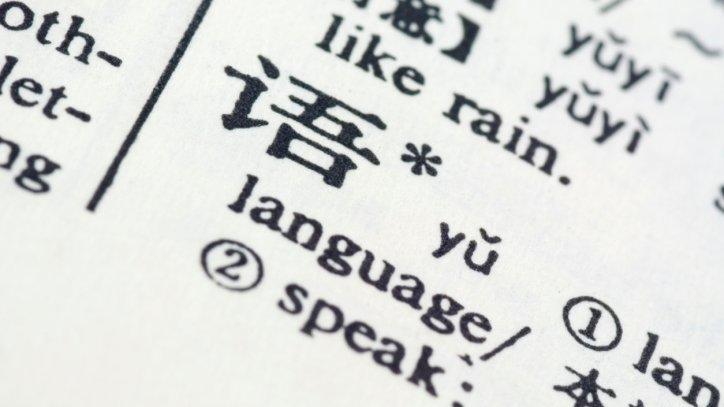China's Xiang Xiaohan: First gay man to sue the government
- Published
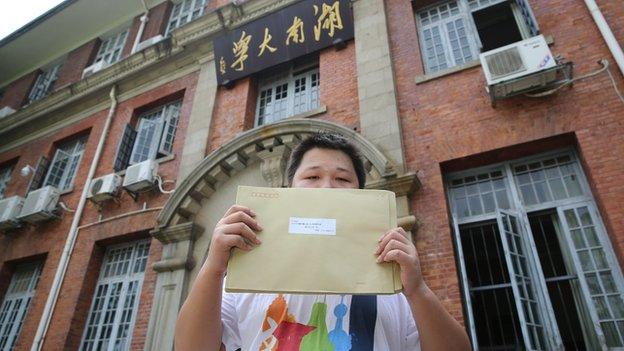
Xiang Xiaohan holding an open letter in front Hunan University urging the public to support his cause (Photo: courtesy of Xiang Xiaohan)
Nineteen-year-old Xiang Xiaohan, a gay rights activist from Hunan Province, has been dubbed China's Don Quixote over his dogged determination to take the government to court.
His campaign to challenge a decision by the civil affairs department of Hunan government not to register his gay rights organisation marks a rare open protest by China's gay and lesbian community and has thrown him into the media spotlight.
In a country where homosexuality was illegal until 1997 and defined as a mental disorder until 2001, it has pushed the tolerance of the ruling Communist Party and the government to the limit, and polarised public opinion.
But in a rare show of support, even the state-run Xinhua news agency, regarded as the mouthpiece of the government, carried a detailed report, external about his campaign after he filed his defamation lawsuit against the Hunan government.
In an interview with the BBC, Xiang Xiaohan said that the chance of the Hunan government backing down was slim, but he would not give up - not without a fight.
"The apology is not only for me, but for hundreds of thousands of gay men and women in China."
"Spiritual civilisation"
Xiang Xiaohan filed the lawsuit in the provincial capital, Changsha, after the Hunan government turned down his application to register his organisation.
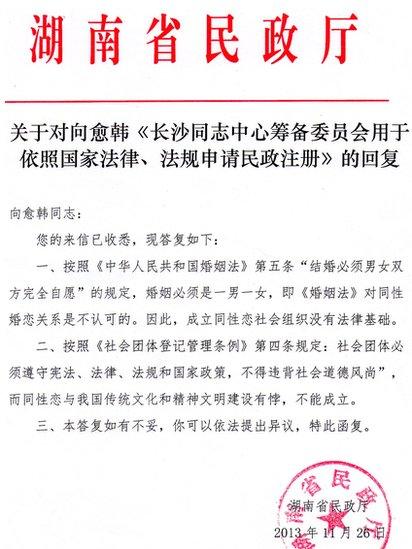
A copy of Hunan government's reply to Xiang Xiaohan which said homosexuality had no place in traditional Chinese culture
In a written reply to him, the local government said homosexuality had no place in Chinese traditional culture and "the building of spiritual civilisation" - a catchphrase in modern China for what many believe is the party's indoctrination.
"I believe what the government said [in the reply] defames the reputation of the gay and lesbian community in China, and I want them to issue a written apology," said Mr Xiang.
He also wants the government to reverse its decision not to register his organisation. Registering his group as an NGO would enable it to legally receive donations and enjoy tax exemptions.
In China, some NGOs already devote considerable resources to protecting gay rights but they do not openly operate in the name of the gay community. But Mr Xiang's organisation, if successfully registered as an NGO, would be the first of its kind in China.
Currently, the group, housed in a small rented flat and all expenses paid for by volunteers, is treated as a commercial entity, making it expensive and difficult to carry out activities, he said.
The lawsuit was filed on 19 February. Under current law, the court must inform the plaintiff within seven days whether it plans to proceed with the case.
But Mr Xiang received a written reply from the court only on 14 March, despite repeated requests for a response.
The court threw out the case because it did not believe that the government defamed homosexuals, Mr Xiang said.
The court believed that the government only offered what it called administrative guidance on the issue of homosexuality, he said.
Mr Xiang said that he would appeal against the ruling.
"If we can't force the civil affairs department of the Hunan government to withdraw what it said on homosexuality, then other government bodies would likely follow its example, and this would cause irreparable psychological damage to gay and lesbian people.
"If gay and lesbian people have no place in China's traditional culture, how can you encourage them to pursue the China Dream," he said, referring to President Xi Jinping's publicly stated vision for the future of the country.
'Transparent'
Analysts say Xiang Xiaohan's high profile protest has offered a rare glimpse into the extent to which attitudes towards homosexuality in China have changed.
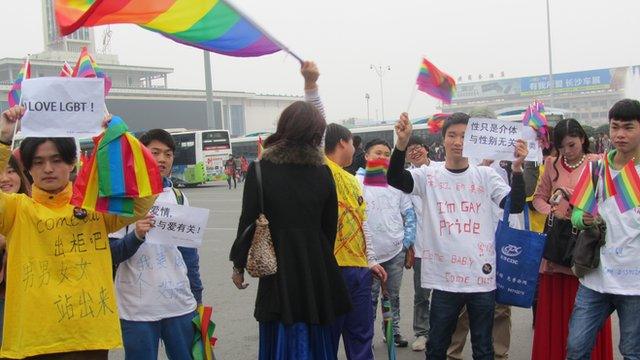
Xiang Xiaohan's organization has organised events in Hunan province (Photo: courtesy of Xiang Xiaohan)
His campaign may have seen him compared with the naive hero in Cervantes' novel Don Quixote, but his protest has also highlighted the rising awareness of China's gay community about their rights.
Yu Fang Qiang from Justice For All - a non-profit organisation dedicated to safeguarding the rights of disadvantaged members of the public - said it also marked a significant step forward by the government.
"It is the first time in China that a local government department has formally given a written reply to a request from the gay and lesbian community, whereas in the past the government would just simply ignore it," he told the BBC.
It is also rare that a court in China has dealt with Xiang Xiaohan's lawsuit against Hunan government in an open and transparent way, Mr Yu said.
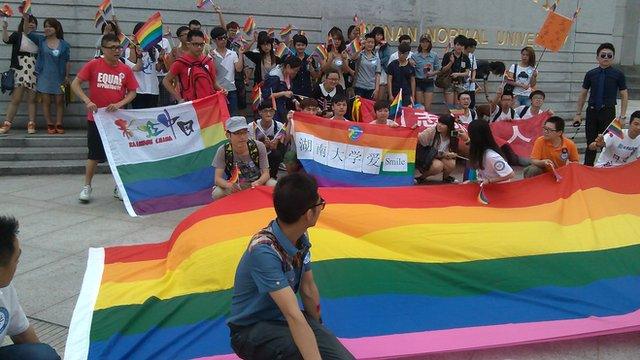
Xiang Xiaohan's lawsuit has pushed the tolerance of the party to the limit (Photo: courtesy of Xiang Xiaohan)
Mr Xiang's story has polarised opinion among micro-bloggers.
On Sina Weibo, China's equivalent of Twitter, one blogger who supported Xiang Xiaohan, said the government should redefine China's traditional culture.
"The practice of forcing Chinese women to bind their feet and forbidding those whose husbands died to remarry is also regarded as China's traditional culture," the blogger wrote.
But another disagreed, saying "gay and lesbian activists, you can do whatever you want to do privately. But China's society will not support you. Don't force your thinking upon a society which still values traditional ideas and beliefs."
Xiang Xiaohan is undaunted.
"This is a fight for the long term. We will continue to try to encourage the government to safeguard gay and lesbian rights through laws and agree to register our organisation," he said.
"I'm confident that gays and lesbians will be fully accepted in China even though it may take 20, 30 or even 50 years for it to happen."
- Published21 July 2012
